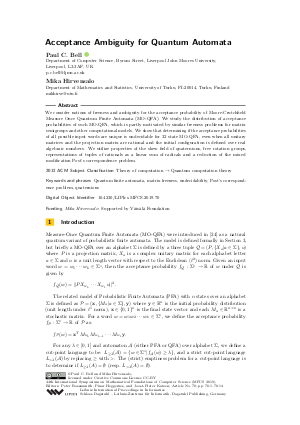Acceptance Ambiguity for Quantum Automata
Authors
Paul C. Bell  ,
Mika Hirvensalo
,
Mika Hirvensalo
-
Part of:
Volume:
44th International Symposium on Mathematical Foundations of Computer Science (MFCS 2019)
Part of: Series: Leibniz International Proceedings in Informatics (LIPIcs)
Part of: Conference: Mathematical Foundations of Computer Science (MFCS) - License:
 Creative Commons Attribution 3.0 Unported license
Creative Commons Attribution 3.0 Unported license
- Publication Date: 2019-08-20
File

PDF
LIPIcs.MFCS.2019.70.pdf
- Filesize: 487 kB
- 14 pages
Document Identifiers
Subject Classification
ACM Subject Classification
- Theory of computation → Quantum computation theory
Keywords
- Quantum finite automata
- matrix freeness
- undecidability
- Post’s correspondence problem
- quaternions
Metrics
- Access Statistics
-
Total Accesses (updated on a weekly basis)
0Document
0Metadata
Abstract
We consider notions of freeness and ambiguity for the acceptance probability of Moore-Crutchfield Measure Once Quantum Finite Automata (MO-QFA). We study the distribution of acceptance probabilities of such MO-QFA, which is partly motivated by similar freeness problems for matrix semigroups and other computational models. We show that determining if the acceptance probabilities of all possible input words are unique is undecidable for 32 state MO-QFA, even when all unitary matrices and the projection matrix are rational and the initial configuration is defined over real algebraic numbers. We utilize properties of the skew field of quaternions, free rotation groups, representations of tuples of rationals as a linear sum of radicals and a reduction of the mixed modification Post’s correspondence problem.
Cite As Get BibTex
Paul C. Bell and Mika Hirvensalo. Acceptance Ambiguity for Quantum Automata. In 44th International Symposium on Mathematical Foundations of Computer Science (MFCS 2019). Leibniz International Proceedings in Informatics (LIPIcs), Volume 138, pp. 70:1-70:14, Schloss Dagstuhl – Leibniz-Zentrum für Informatik (2019)
https://doi.org/10.4230/LIPIcs.MFCS.2019.70
BibTex
@InProceedings{bell_et_al:LIPIcs.MFCS.2019.70,
author = {Bell, Paul C. and Hirvensalo, Mika},
title = {{Acceptance Ambiguity for Quantum Automata}},
booktitle = {44th International Symposium on Mathematical Foundations of Computer Science (MFCS 2019)},
pages = {70:1--70:14},
series = {Leibniz International Proceedings in Informatics (LIPIcs)},
ISBN = {978-3-95977-117-7},
ISSN = {1868-8969},
year = {2019},
volume = {138},
editor = {Rossmanith, Peter and Heggernes, Pinar and Katoen, Joost-Pieter},
publisher = {Schloss Dagstuhl -- Leibniz-Zentrum f{\"u}r Informatik},
address = {Dagstuhl, Germany},
URL = {https://drops.dagstuhl.de/entities/document/10.4230/LIPIcs.MFCS.2019.70},
URN = {urn:nbn:de:0030-drops-110149},
doi = {10.4230/LIPIcs.MFCS.2019.70},
annote = {Keywords: Quantum finite automata, matrix freeness, undecidability, Post’s correspondence problem, quaternions}
}
Author Details
- Department of Computer Science, Byrom Street, Liverpool John Moores University, Liverpool, L3-3AF, UK
Funding
- Hirvensalo, Mika: Supported by Väisälä Foundation
References
-
P. C. Bell, S. Chen, and L. M. Jackson. Scalar ambiguity and freeness in matrix semigroups over bounded languages. In Language and Automata Theory and Applications, volume LNCS 9618, pages 493-505, 2016.

-
P. C. Bell, V. Halava, and M. Hirvensalo. Decision Problems for Probabilistic Finite Automata on Bounded Languages. Fundamenta Informaticae, 123(1):1-14, 2012.

-
P. C. Bell and I. Potapov. Periodic and infinite traces in matrix semigroups. Current Trends in Theory and Practice of Computer Science (SOFSEM), LNCS 4910:148-161, 2008.

-
P. C. Bell and I. Potapov. Reachability problems in quaternion matrix and rotation semigroups. Information and Computation, 206(11):1353-1361, 2008.

-
P. C. Bell and I. Potapov. On the undecidability of the identity correspondence problem and its applications for word and matrix semigroups. International Journal of Foundations of Computer Science, 21(6):963-978, 2010.

-
A. Bertoni, G. Mauri, and M. Torelli. Some recursively unsolvable problems relating to isolated cutpoints in probabilistic automata. In Automata, Languages and Programming, volume 52 of LNCS, pages 87-94, 1977.

-
A. S. Besicovitch. On the linear independence of fractional powers of integers. J. London Math. Soc., 15:3-6, 1940.

-
V. Blondel and V. Canterini. Undecidable problems for probabilistic automata of fixed dimension. Theory of Computing Systems, 36:231-245, 2003.

-
V. Blondel, E. Jeandel, P. Koiran, and N. Portier. Decidable and undecidable problems about quantum automata. SIAM Journal on Computing, 34:6:1464-1473, 2005.

-
A. Brodsky and N. Pippenger. Characterizations of 1-way quantum finite automata. SIAM Journal on Computing, 31:1456-1478, 2002.

-
J. Cassaigne, T. Harju, and J. Karhumäki. On the undecidability of freeness of matrix semigroups. International Journal of Algebra and Computation, 9(3-4):295-305, 1999.

-
J. Cassaigne and F. Nicolas. On the decidability of semigroup freeness. RAIRO - Theoretical Informatics and Applications, 46(3):355-399, 2012.

-
É. Charlier and J. Honkala. The freeness problem over matrix semigroups and bounded languages. Information and Computation, 237:243-256, 2014.

-
C. Choffrut and J. Karhumäki. Some decision problems on integer matrices. Informatics and Applications, 39:125-131, 2005.

-
T. Colcombet, J. Ouaknine, P. Semukhin, and J. Worrell. On reachability problems for low dimensional matrix semigroups. In ArXiV Manuscript (to appear ICALP'19), volume arXiv:1902.09597, pages 1-15, 2019.

-
V. Halava, T. Harju, and M. Hirvensalo. Undecidability bounds for integer matrices using Claus instances. International Journal of Foundations of Computer Science (IJFCS), 18,5:931-948, 2007.

-
M. Hirvensalo. Improved undecidability results on the emptiness problem of probabilistic and quantum cut-point languages. SOFSEM 2007: Theory and Practice of Computer Science, Lecture Notes in Computer Science, 4362:309-319, 2007.

-
J. Honkala. Decision problems concerning thinness and slenderness of formal languages. In Acta Informatica, volume 35, pages 625-636, 1998.

-
R. A. Horn and C. R. Johnson. Topics in matrix analysis. Cambridge University Press, 1991.

-
D. A. Klarner, J.-C. Birget, and W. Satterfield. On the undecidability of the freeness of integer matrix semigroups. International Journal of Algebra and Computation, 1 (2):223-226, 1991.

-
S.-K. Ko and I. Potapov. Vector ambiguity and freeness problems in SL(2, ℤ). Fandumenta Informaticae, 162(2-3):161-182, 2018.

-
W. Kuich and A. Salomaa. Semirings, Automata, Languages, volume 5. Springer, 1986.

-
E. Lengyel. Mathematics for 3D Game Programming & Computer Graphics. Charles River Media, 2004.

-
C. Moore and J. P. Crutchfield. Quantum automata and quantum grammars. Theoretical Computer Science, 237(1-2):275-306, 2000.

-
M. S. Paterson. Unsolvability in 3× 3 matrices. Studies in Applied Mathematics, 49(1):105-107, 1970.

-
A. Paz. Introduction to Probabilistic Automata. Academic Press, 1971.

-
S. Swierczkowski. A class of free rotation groups. Indag. Math., 5(2):221-226, 1994.

